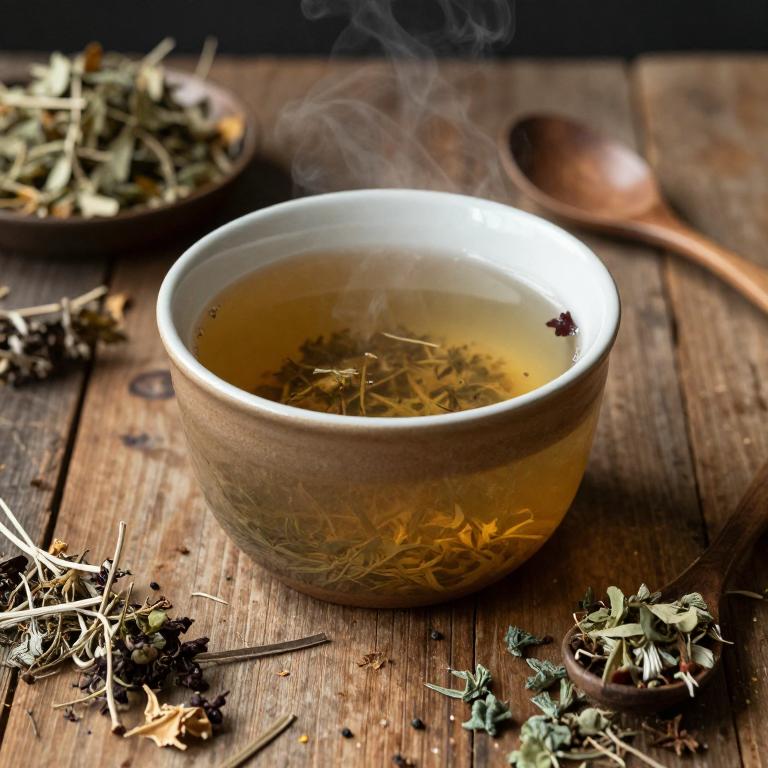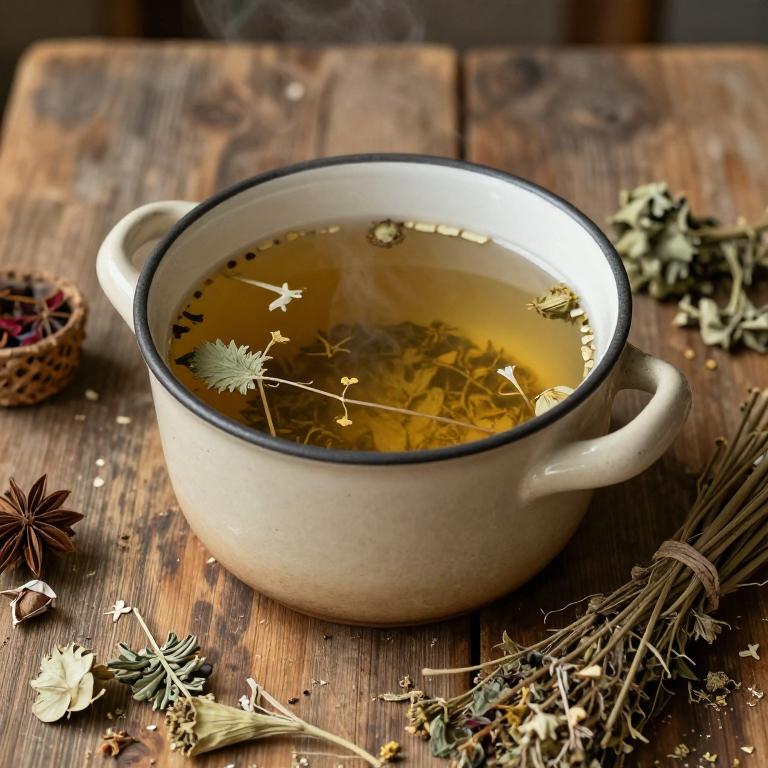10 Best Herbal Decoctions For Mucus In Throat

Herbal decoctions have been traditionally used to alleviate mucus buildup in the throat, offering a natural alternative to conventional treatments.
Common herbs such as thyme, echinacea, and ginger are often included in these decoctions due to their anti-inflammatory and expectorant properties. To prepare a decoction, the herbs are typically simmered in water for an extended period to extract their active compounds, which can help loosen and expel mucus. These remedies are particularly favored for their soothing effects on the throat and their potential to reduce irritation without harsh side effects.
However, individuals should consult with a healthcare provider before using herbal decoctions, especially if they have underlying health conditions or are taking other medications.
Table of Contents
- 1. Thyme (Thymus vulgaris)
- 2. Ginger (Zingiber officinale)
- 3. Peppermint (Mentha piperita)
- 4. Eucalyptus (Eucalyptus globulus)
- 5. Licorice (Glycyrrhiza glabra)
- 6. Fennel (Foeniculum vulgare)
- 7. Salvia (Salvia officinalis)
- 8. Rosemary (Rosmarinus officinalis)
- 9. Stinging nettle (Urtica dioica)
- 10. Parsley (Petroselinum crispum)
1. Thyme (Thymus vulgaris)

Thymus vulgaris, commonly known as thyme, is a herb widely used in traditional medicine for its soothing properties, particularly in alleviating mucus buildup in the throat.
Herbal decoctions made from thyme leaves and flowers are prepared by simmering the dried plant material in water, allowing the essential oils and active compounds to infuse into the liquid. These decoctions are valued for their antimicrobial and expectorant effects, which help to loosen and expel mucus from the respiratory tract. The primary active compounds, such as thymol and carvacrol, contribute to the herb's ability to reduce inflammation and combat throat infections.
Regular consumption of thyme decoctions may provide relief from symptoms associated with coughs, colds, and throat irritation, making it a popular natural remedy for respiratory discomfort.
2. Ginger (Zingiber officinale)

Zingiber officinale, commonly known as ginger, has been traditionally used in herbal medicine to alleviate symptoms associated with mucus in the throat.
Its active compounds, such as gingerol and shogaol, possess anti-inflammatory and antimicrobial properties that help reduce throat irritation and combat respiratory infections. A ginger herbal decoction can be prepared by simmering fresh or dried ginger root in water, allowing the beneficial compounds to infuse into the liquid. This decoction is often consumed warm to soothe the throat and promote expectoration of mucus.
While generally safe, individuals with gastrointestinal sensitivities should use ginger cautiously and consult a healthcare provider if symptoms persist.
3. Peppermint (Mentha piperita)

Mentha piperita, commonly known as peppermint, is often used in herbal decoctions to alleviate symptoms of mucus buildup in the throat.
The active compounds in peppermint, such as menthol and methyl salicylate, have soothing and decongestant properties that can help reduce irritation and loosen mucus. To prepare a decoction, fresh or dried peppermint leaves are boiled in water for several minutes, then strained and consumed warm. This herbal remedy is particularly effective for mild cases of throat congestion and can be used as a natural alternative to over-the-counter medications.
However, it is important to consult a healthcare professional before use, especially for individuals with known allergies or underlying health conditions.
4. Eucalyptus (Eucalyptus globulus)

Eucalyptus globulus, commonly known as the Australian tea tree, is often used in herbal decoctions to alleviate symptoms of mucus buildup in the throat.
The essential oils extracted from its leaves, particularly cineole, have expectorant properties that help loosen and expel mucus from the respiratory tract. To prepare a decoction, the dried leaves are simmered in water for several minutes, creating a soothing herbal tea. This remedy is particularly beneficial for individuals suffering from colds, sore throats, or bronchitis due to its anti-inflammatory and antimicrobial effects.
While generally safe, it is advisable to consult a healthcare professional before using eucalyptus globulus, especially for pregnant women or those with existing medical conditions.
5. Licorice (Glycyrrhiza glabra)

Glycyrrhiza glabra, commonly known as licorice root, has been traditionally used in herbal medicine for its soothing effects on the respiratory system.
Herbal decoctions made from licorice root are often prepared by simmering the dried root in water to extract its active compounds, including glycyrrhizin and flavonoids. These decoctions are believed to help reduce inflammation and thin mucus in the throat, making them useful for alleviating symptoms of coughs and sore throats. The expectorant properties of licorice root may enhance the clearance of mucus, promoting easier breathing and comfort.
However, long-term use of licorice root decoctions should be approached with caution due to potential side effects such as hypertension and electrolyte imbalances.
6. Fennel (Foeniculum vulgare)

Foeniculum vulgare, commonly known as fennel, has been traditionally used in herbal medicine for its potential benefits in reducing mucus in the throat.
A decoction of fennel seeds is often prepared by boiling the seeds in water for several minutes, allowing the active compounds to infuse into the liquid. This preparation is believed to help soothe irritated throat tissues and promote the expulsion of excess mucus. The essential oils in fennel, such as anethole and limonene, are thought to have expectorant properties that aid in clearing respiratory congestion.
However, while some studies suggest its efficacy, it is advisable to consult a healthcare professional before using fennel decoctions, especially for prolonged or chronic throat conditions.
7. Salvia (Salvia officinalis)

Salvia officinalis, commonly known as sage, has been traditionally used in herbal medicine for its potential benefits in reducing mucus in the throat.
Herbal decoctions made from sage leaves are often prepared by simmering the dried leaves in water for several minutes, allowing the active compounds to infuse into the liquid. These decoctions are believed to have antimicrobial and anti-inflammatory properties that may help soothe irritated throats and decrease excess mucus production. Sage is also thought to act as a mild expectorant, aiding in the removal of mucus from the respiratory tract.
While some studies suggest that sage may have therapeutic effects on respiratory conditions, it is important to consult a healthcare professional before using it for persistent or severe throat issues.
8. Rosemary (Rosmarinus officinalis)

Rosmarinus officinalis, commonly known as rosemary, has been traditionally used in herbal decoctions to alleviate symptoms of mucus buildup in the throat.
The essential oils and phytochemicals present in rosemary, such as camphor and rosmarinic acid, possess antimicrobial and anti-inflammatory properties that can help reduce throat irritation and loosen mucus. To prepare a decoction, fresh or dried rosemary leaves are simmered in water for several minutes, creating a soothing herbal infusion. This remedy is often used as a natural alternative to conventional treatments for sore throat and respiratory congestion.
However, it is important to consult with a healthcare professional before using rosemary decoctions, especially for individuals with existing health conditions or those taking medications.
9. Stinging nettle (Urtica dioica)

Urtica dioica, commonly known as stinging nettle, has been traditionally used in herbal medicine for its various health benefits, including its potential to alleviate mucus buildup in the throat.
When prepared as a herbal decoction, stinging nettle is typically boiled in water to extract its medicinal compounds, which may help reduce inflammation and soothe irritated throat tissues. The plant contains mucilage and other compounds that can act as a demulcent, providing a protective layer over the mucous membranes in the throat. Some studies suggest that the anti-inflammatory and antioxidant properties of Urtica dioica may support respiratory health and ease symptoms associated with excess mucus.
However, it is important to consult with a healthcare professional before using stinging nettle decoctions, especially for individuals with allergies or existing medical conditions.
10. Parsley (Petroselinum crispum)

Petroselinum crispum, commonly known as parsley, has been traditionally used in herbal medicine for its potential benefits in reducing mucus in the throat.
The leaves of this plant contain compounds such as apiol and limonene, which may help to soothe irritation and loosen mucus, making it easier to expel. Herbal decoctions made from fresh or dried parsley can be prepared by simmering the leaves in water for several minutes, allowing the active components to infuse into the liquid. These decoctions are often consumed as a tea to alleviate symptoms of congestion, coughing, and throat discomfort.
While parsley is generally safe, it is important to consult a healthcare professional before using it for medicinal purposes, especially for those with allergies or existing health conditions.